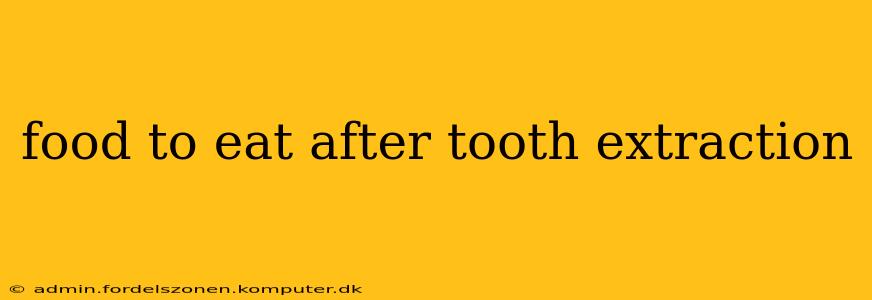Having a tooth extracted can be a bit daunting, but knowing what to eat afterward can significantly impact your healing process. This guide will provide you with a comprehensive list of suitable foods and drinks, addressing common concerns and questions. We'll explore the best options for post-extraction nutrition, focusing on soft, easy-to-chew foods that won't disturb the extraction site.
What should I eat after a tooth extraction?
The key is to consume foods that are soft, require minimal chewing, and are nutritious. Avoid anything that could dislodge the blood clot forming in the extraction socket, which is crucial for healing. In the first 24 hours, focus on liquids and very soft foods. After that, you can gradually introduce slightly firmer textures.
Here are some excellent choices:
- Smoothies: Packed with nutrients and easy to consume. Use yogurt or milk as a base, and add fruits, vegetables, and protein powder for a complete meal replacement.
- Soups: Broth-based soups are ideal, especially those with soft vegetables like carrots or potatoes. Avoid soups with chunky ingredients or those that are too hot.
- Yogurt: Provides protein and probiotics, which are beneficial for gut health. Choose plain yogurt and add a touch of honey or fruit for flavor.
- Applesauce: A classic choice, providing essential nutrients in a smooth, easy-to-eat form.
- Mashed potatoes: A comforting and nutritious option, easily digestible and soft on the gums.
- Scrambled eggs: A great source of protein, just make sure they're cooked until very soft.
- Oatmeal: Provides fiber and energy, but choose well-cooked oatmeal to avoid any crunchy bits.
- Pudding: A simple, smooth dessert that can provide a boost of calories and comfort.
What should I avoid after a tooth extraction?
You need to avoid foods that could irritate the extraction site or dislodge the blood clot. This means staying away from:
- Anything hard or crunchy: This includes nuts, chips, crackers, hard candy, and raw vegetables.
- Spicy foods: These can irritate the sensitive area and delay healing.
- Foods that require significant chewing: Anything that needs vigorous chewing should be avoided.
- Hot foods and drinks: The heat can increase swelling and discomfort.
- Straws: The sucking motion can dislodge the blood clot, leading to complications.
- Alcohol and smoking: These hinder the healing process and increase the risk of infection.
Can I eat ice cream after a tooth extraction?
Ice cream can be a tempting treat, especially when experiencing post-extraction discomfort. However, it's a bit of a double-edged sword. While the cold can help numb the pain and reduce swelling initially, it can also be hard to manage if it melts too quickly. Stick to small portions of very soft ice cream.
What kind of drinks are safe after a tooth extraction?
Hydration is vital for healing, so drinking plenty of fluids is essential. Stick to:
- Water: The best choice for hydration and rinsing the mouth gently.
- Clear broths: Nourishing and gentle on the extraction site.
- Milk or yogurt drinks: Provides protein and calcium for healing.
- Smoothies: Again, a good way to get nutrients and stay hydrated.
Avoid carbonated drinks, as the bubbles can irritate the area.
How long should I avoid certain foods after tooth extraction?
The duration you need to stick to a soft food diet depends on the complexity of the extraction and your individual healing process. Generally, it's recommended to avoid hard and crunchy foods for at least a week, and gradually reintroduce them as your comfort level allows. Always follow your dentist's specific instructions.
What if I accidentally eat something I shouldn't have?
If you accidentally consume something that irritates the extraction site, rinse your mouth gently with saltwater. If you experience significant pain, bleeding, or infection, contact your dentist immediately.
Remember, proper nutrition plays a crucial role in your recovery after a tooth extraction. Following these guidelines will help ensure a smoother, faster healing process. Always consult your dentist or oral surgeon for personalized advice and follow their post-operative instructions carefully.
